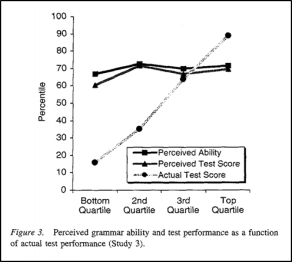
If you take a couple of minutes to search for resources that are designed to help students self-assess, you’ll find there are plenty. Some require students to RAG-rate themselves against a set criteria, usually taken from a mark scheme. Others enable students to indicate how confident they feel about particular aspects of a topic with the help of cartoonish thumbs pointing upwards and downwards or through a spectrum of expressive emoticons. Resources like these seem to be popular, and with good reason: it’s important for students to self-consciously reflect on their own learning. However, making accurate self-assessment judgements isn’t particularly easy to achieve. At least part of the reason for this is because of the Dunning-Kruger effect.
The Dunning-Kruger effect is a common cognitive bias that leads us to overestimate our abilities in many social and intellectual domains. Those most susceptible to this form of illusory superiority typically possess limited knowledge and are relatively unskilled. David Dunning and Justin Kruger first observed the phenomenon in 1999, whilst they were both at Cornell University. You can read their full paper here. In one particular study, Dunning and Kruger asked participants to complete a test assessing their knowledge of American Standard Written English (ASWE); participants were also asked to make predictions about how they expected to perform in relation to others. The findings – predicted by Dunning and Kruger – revealed that low-performing (i.e. bottom-quartile) participants tended to hold the mistaken view that they would perform reasonably well.

After conducting three other studies, Dunning and Kruger came to the following conclusion:
Those with limited knowledge in a particular domain suffer a dual burden: not only do they reach mistaken conclusions and make regrettable errors, but their incompetence robs them of the ability to realise it.
Where self-assessment is concerned, it’s important to keep in mind that most students are novices. This means that they won’t necessarily be able to identify their strengths and weaknesses, and gauge their levels of competency, with accuracy and precision. In English, the subject that I teach, a typical KS4 self-assessment task might require students to make a series of judgements based on the broad statements below:
- I can use a range of punctuation marks, mostly with success
- I can use a variety of sentence forms for effect
- I can use an increasingly sophisticated vocabulary
- My spelling is generally accurate
Would most students be able to accurately gauge whether or not they can use a range of punctuation marks, mostly with success? I’d argue not, particularly because we, as teachers, often struggle to reach a consensus about what ‘success’ looks like. And so, where self-assessment is used for summative purposes, it’s a pretty blunt tool. Students are likely to be overconfident in their own abilities because they don’t know what they don’t know. Conversely, in some cases, students may actually erroneously underestimate their levels of competence (this cognitive bias is called the imposter syndrome, and it’s one of the corollaries of the Dunning-Kruger effect). Either way, it’s tricky business.
Beyond the thorny practicalities of making accurate judgements, self-assessment is often used to encourage metacognition – to help students become more self-consciously aware of their own learning and thought processes. In my view, this is where gains can be made. Whilst – of course – it’s hardly a straightforward proposition, there are practical strategies that can be used to help students productively think about their thinking and, in the process, mitigate the problematic consequences of the Dunning-Kruger effect. For me, there are the two big-hitters in particular:
- Put away the mark-schemes and show students plenty of exemplar material
- Avoid cheap praise and encourage evaluation
Students need to know what quality looks like beyond the mark schemes and grade descriptors. Actively discussing the characteristics of good (and bad) material helps enable students to see – first-hand – how they compare to others. Where this process is concerned, avoiding cheap praise will help to encourage a mind-set of productive humility. And this is crucial because we only really start to improve when we recognise our own limitations.
Thanks for reading –
Doug
One thought on “The Dunning-Kruger Effect”